Denis Goldberg – A True Jewish Hero of the Anti-Apartheid struggle who was mourned by millions and hated by the Zionists
Sentenced life imprisonment alongside Mandela at the 1963-4 Rivonia to Trial, Goldberg’s death passed unnoticed in Israel where opposition to racism and Apartheid is not a popular cause
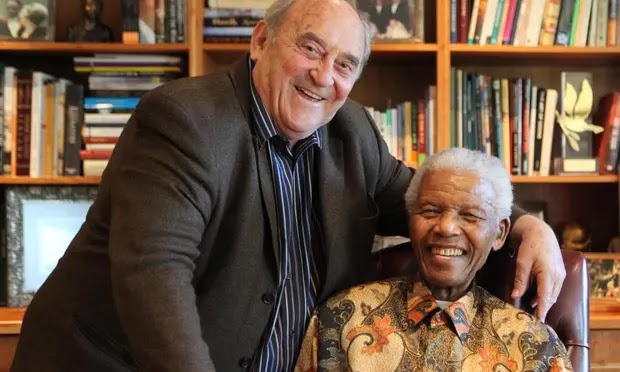
Denis Goldberg and Nelson Mandela
When Marek Edelman, Commander of the Warsaw Ghetto Resistance died in 2009, Moshe Arens, Likud’s former Foreign Minister wrote that:
‘He had received Poland’s highest honor, and at the 65th commemoration of the Warsaw ghetto uprising he was awarded the French Legion of He died not having received the recognition from Israel that he so richly deserved.’
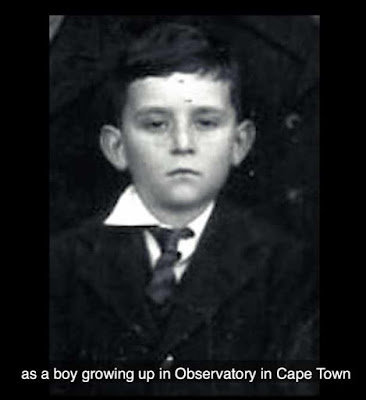
In my own commemoration I wrote that:
The President of Poland spoke at his funeral, held in the old Jewish cemetery of Warsaw. Two thousand people attended the grave-side ceremony. But no one from the Israeli government attended – though Israel’s former ambassador to Poland, Shevach Weiss, attended in a personal capacity. No official representative of any international Jewish organization attended either: not even from the Holocaust memorialization organizations. As far as I can tell, neither the Jerusalem Post nor Ha’aretz ran a story when Edelman died, nor any sort of eulogy.
Marek Edelman was probably fortunate not to have had a hypocritical tribute by a state founded on the same principles as the European fascists of the 1930s.
The same is true of Denis Goldberg, who died of cancer on April 29th aged 87, a Jewish veteran of the anti-Apartheid struggle. Israel calls itself a ‘Jewish’ state but it doesn’t care to celebrate Jewish heroes of the fight against racism. Indeed it barely acknowledges the contribution of anti-Zionist Jews to Jewish history. They are written out of Zionist history. This is probably a good thing as there could be no greater dishonour than to be praised by the apartheid regime in Tel Aviv and its sycophants.
Only a couple of months ago I had the privilege of attending a packed meeting at Sussex University, which was addressed by Albie Sachs, another Jewish veteran of the anti-Apartheid struggle. Sachs was blinded in one eye and lost an arm when opening a letter bomb from South Africa’s secret police, BOSS.
Last year I attended a meeting at SOAS with Ronnie Kassrill’s, the former ANC security minister and commander of Umkhonto we Sizwe, the ANC’s military wing. Ronnie told us how, under the IHRA misdefinition of ‘anti-Semitism’ his meeting in support of the Palestinians was banned by Vienna’s local authority from Council property. The decision had been unanimous. The Green Party, the SPD and Austria’s neo-Nazi Freedom Party had all voted together to ban a Jewish veteran of the anti-apartheid struggle. Such are the alliances that have been formed in defence of the world’s only apartheid state.
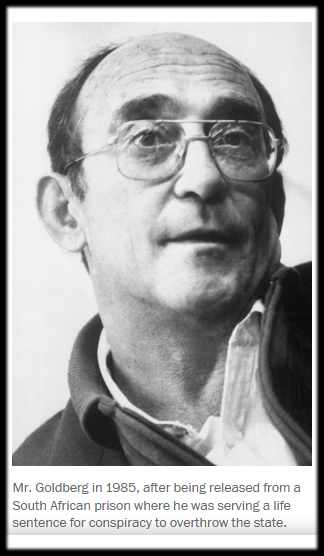
Denis Goldberg was born on April 11 1933 in Cape Town to Annie and Sam, communist working-class Jewish immigrants from Britain who would die when their son was in prison. His mother later spent time in prison for her anti-apartheid activism. His parents were the children of Jewish immigrants from Lithuania. He recalled that his opposition to racism began at the age of six when he and his parents would give food to striking workers.
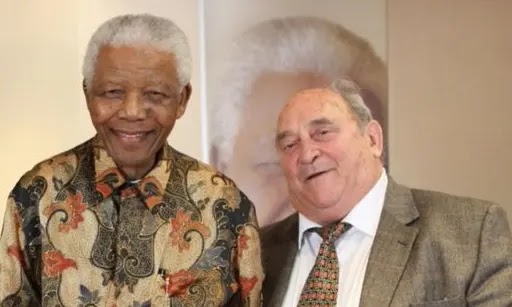
Goldberg grew up reading about Nazi atrocities during the Second World War. After leaving the Observatory Boys School he studied civil engineering at the University of Cape Town because, he said, he wanted to “build roads and bridges, dams and pipelines for people”. Why did he get involved in the anti-Apartheid struggle? He told a 2019 interviewer with the University of Cape Town.
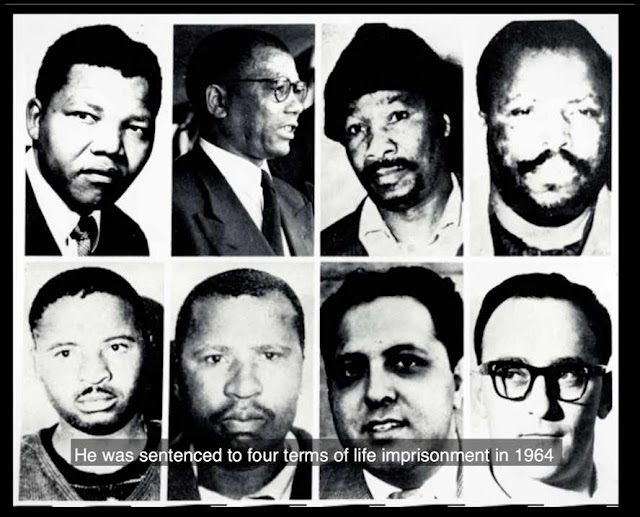
Denis Goldberg with fellow Rivonia defendants
“I understood that what was happening in South Africa with its racism was like the racism of Nazi Germany in Europe that we were supposed to be fighting against,”
“You have to be involved one way or another. That’s what I grew up with. I come from a generation who were prepared to put our lives on the line for freedom”
Just as Denis Goldberg was inspired to oppose Apartheid by what the Nazis had done to the Jews so many Jews today oppose Israel, the so-called Jewish state for the same reasons. Hatred of racism is a universal principle or it is nothing.
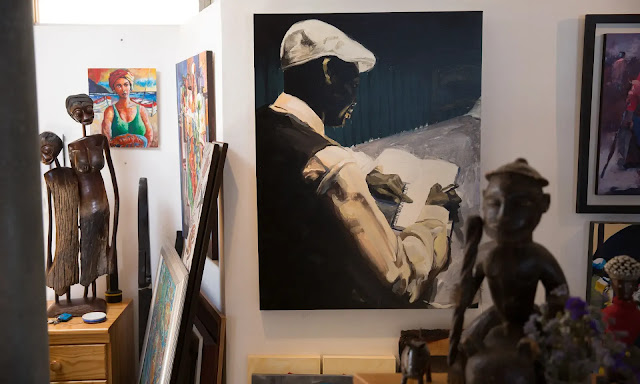
Denis’s Art Collection
It was at Cape Town University that he met Esme Bodenstein, a physiotherapist and fellow activist whom he married in 1954. They had two children, Hilary, who ran a nursery in London and predeceased him, and David, who went into finance, working in foreign exchange in the City.
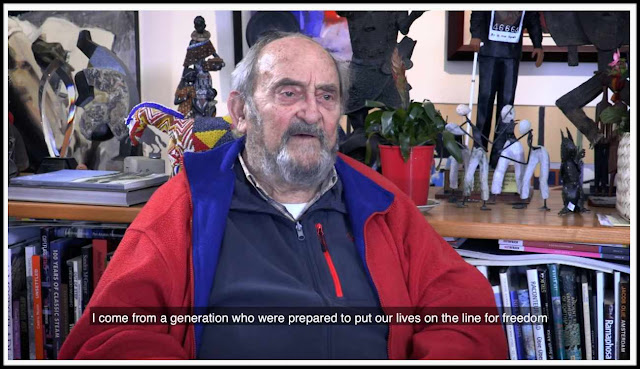
In 1957 Goldberg joined the banned Communist Party and his first run-in with the law came in 1960, during protests following the Sharpeville massacre when 69 unarmed protestors were shot dead by South African police. During the state of emergency imposed after the Sharpeville massacre of 1960 he was imprisoned for four months as the regime cracked down on activists. He again lost his job, this time with a construction company building a power station. Following his release from custody, he joined the military wing of the African National Congress (ANC), uMkhonto we Sizwe.
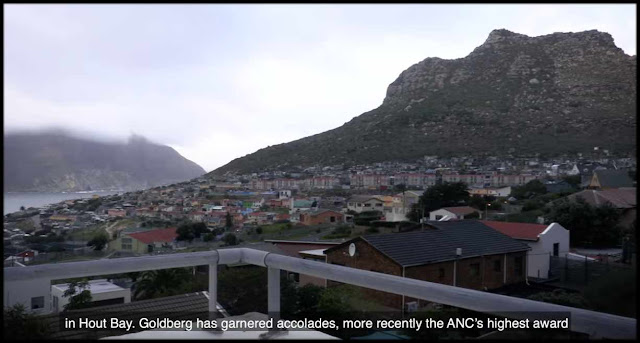
In 1962 Mandela set up Umkhonto we Sizwe (MK) and Goldberg, now notorious as “the most dangerous white man in South Africa”, went underground to set up a training camp near Cape Town for a campaign of sabotage directed at government buildings and infrastructure, the first such camp inside South Africa.
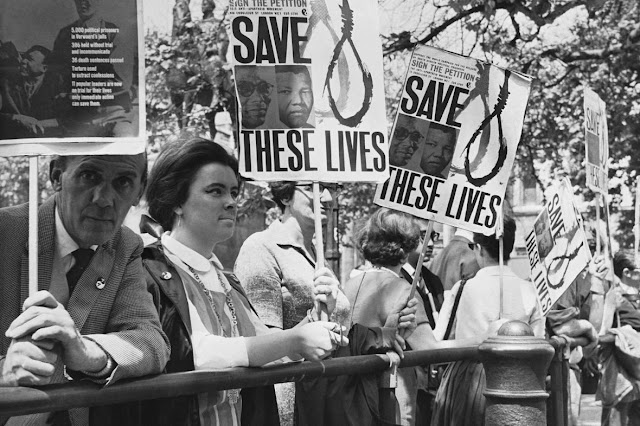
After being arrested Goldberg was sentenced to life imprisonment alongside Nelson Mandela and nine others in the 1964 Rivonia trial in which he was found guilty of sabotage. He was the only white man to be convicted and, at 31, he was the youngest of the defendants. The Defendants had expected to be sentenced to death and it was almost certainly international pressure which averted this.
After their life sentences were handed down, Goldberg’s mother, who was hard of hearing, called down from the public gallery: “Denis, what is it?” He shouted back: “It’s life, and life is wonderful!”. In the documentary, Life is Wonderful, Goldberg emerged as its gentle, self-deprecating but steely star.
When his father died Goldberg did not seek permission to attend his funeral because “I wasn’t going to give them the pleasure of refusing me”.
In prison in Pretoria Goldberg took degrees in Public Administration, History, Geography and Library Science, taught himself German and was half way through a law degree when he was released from prison in 1985 as international pressure forced the apartheid regime into making concessions.
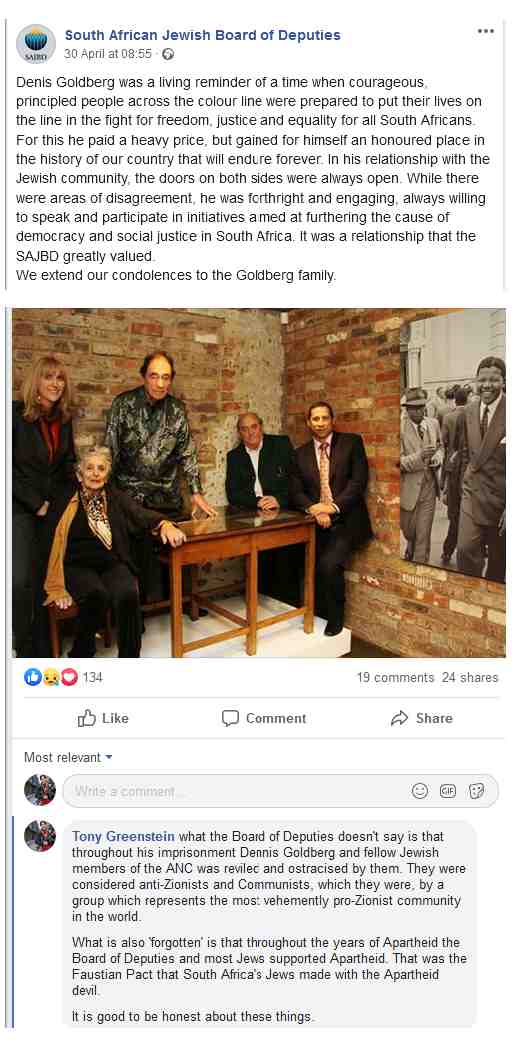
My posting on the South Africa Board of Deputies Facebook Page
On release he was allowed a visit to his father’s grave in a Jewish cemetery in Johannesburg then put on a plane to Tel Aviv. His daughter was working on Kibbutz Ma’ayanei HaYeshu where he stayed for a short period with his family before living in exile in London, where he continued to take part in the anti-Apartheid movement. Though Israel had helped to secure his release, Goldberg denounced its close ties to South Africa’s apartheid regime.
Israel and Zionism
Goldberg recalled that some people questioned his description of Israel as an apartheid state, when Israel, for example, has a number of Palestinian members of parliament and Israeli Palestinians can vote. His response was clear and simple:
“Well I say you don’t need to be like South Africa to be an apartheid state; there is a definition in international law through the UNESCO declaration on apartheid.”
Apartheid exists, he said, in states that enforce laws and policies that discriminate between people on the basis of race or religion, and this holds true in Israel proper as well as in the occupied West Bank and Gaza Strip. He was one of a panel of anti-apartheid activists discussing the lessons that struggle holds for the Palestinian cause.
Like so many of his colleagues in the anti-apartheid movement, Goldberg became a vocal critic of Israel and a stalwart supporter of the Palestinian cause.
Goldberg told an Israel Apartheid Week meeting at Johannesburg University in 2015 that
“There is no doubt in my mind that Israel is an apartheid state. Having lived through apartheid in South Africa, I cannot allow in my name the same kind of oppression to go on.”
“It’s simple: the dominant group excludes the indigenous people from their equal rights within the borders of Israel itself and in the occupied territories, in breach of international law,
In a video urging people not to go on propaganda trips to Israel, Denis Goldberg said that,
“Going on free trips to Israel causes harm to the Palestinian people just as people who visited South Africa and broke the cultural and academic boycott against white South Africa, did harm to our movement.”
He also described the “enormous” lies propagated to defend Israel. “I’ve lived through South African apartheid and I saw it there as well.”
Goldberg added that not a single settlement is built by Israel that is not erected on the ruins of Palestinians homes, their livelihood and the livelihood of their children for generations to come. “This is outrageous, I cannot possibly support them.”
Goldberg said he had a responsibility as a human being to uphold justice, truth and righteousness, “just as I did as a first-generation white South African” who opposed apartheid.
Goldberg also said that the situation in Israel is not as complicated as the Zionist lobby tries to make it seem.
“It’s simple: the dominant group excludes the indigenous people from their equal rights within the borders of Israel itself and in the occupied territories, in breach of international law,”
He said these actions showed an attitude that Palestinians were considered lesser people, which is similar to what happened in South Africa during the apartheid era when blacks were barred from voting
“I have to be an opponent of the exclusionist policies of Zionism, but let me say straight away that I have to be opposed to the exclusionary policies of the feudal Arab states of the Middle East as well.”
When apartheid eventually began to crumble, and Mandela was freed in 1990, he wanted to return to South Africa but his wife was reluctant and Britain was by that time home for his children
He returned to attend Mandela’s inauguration after South Africa’s first free elections in 1994. The following day Elias Motsoaledi, a fellow Rivonia defendant, died. At his wake in Soweto Goldberg received a hero’s welcome.
During a subsequent visit to South Africa that November Goldberg resolved to help rebuild his native country and destroy apartheid’s legacy. He founded a UK-based charity, Community Heart, to help raise standards of health and education for black South Africans.
With his new wife, Goldberg, aged 69, returned to South Africa after 18 years in Britain to work as an adviser to Ronnie Kasrils, then minister of water affairs, in Pretoria, the city of his previous imprisonment. “I have the desire to go home. The time is right and I need a breather,” he said.
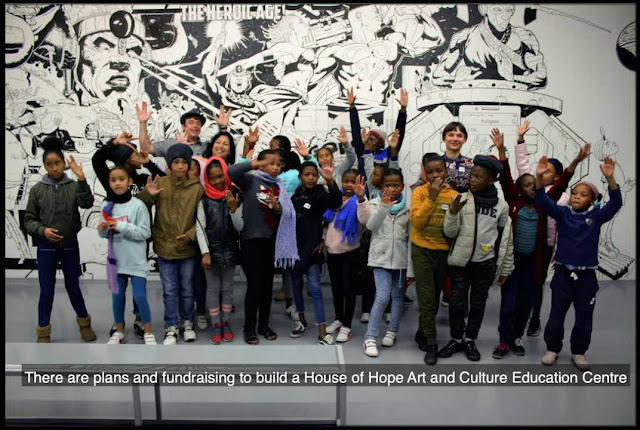
He retired in 2006, and the man who had spent so long staring at walls moved to a house he had built on a hilltop near Cape Town with a spectacular view across Hout Bay. Later that year his second wife died of cancer.
Goldberg never lost faith in the ANC, though he was dismayed by the corruption that engulfed the party during Jacob Zuma’s presidency. Its members needed to “renew the leadership from top to bottom”, he said.
In 2016 he returned to Britain after being invited by David Cameron – along with fellow Rivonia veterans Kathrada and Mlangeni and their surviving lawyers – to a ceremony at Number 10 to honour them and recognise their contribution to the ending of apartheid.
There was a certain irony in having a Tory Prime Minister entertaining those who had been called ‘terrorists’ by Margaret Thatcher two decades before. This shows that ‘terrorism’ is what you call your enemies and if you are the victor then you are no longer a terrorist!
The same year Goldberg published a memoir, A Life for Freedom: The Mission to End Racial Injustice in South Africa.
In 2017, despite having received a diagnosis of lung cancer, Goldberg undertook a campaign to build a centre for the arts, House of Hope, in his hometown of Hout Bay, near Cape Town.
In 2009 he was awarded South Africa’s Order of Luthuli (silver). “A luta continua,” he told a university audience in 2012, repeating a Portuguese anti-colonial rallying cry while urging South Africans to continue the struggle for justice. “Let it continue. . . . I don’t want to see what we fought for collapse.”
Below there are a number of links to obituaries and articles on Denis Goldberg. I am also republishing a wonderful tribute by Gideon Levy, Israel’s bravest journalist, in tribute to Denis Goldberg.
Denis Goldberg, anti-apartheid activist, was born on April 11, 1933. He died of cancer on April 29, 2020
Pioneer Jewish South African Freedom Fighter Calls Israel ‘Apartheid State’
Veteran South African activist Denis Goldberg: Israel ‘an apartheid state’
Denis Goldberg, anti-apartheid activist who spent 22 years in prison, dies at 87
Tributes pour in for veteran anti-apartheid campaigner Denis Goldberg
Tributes to South African anti-Apartheid activist Denis Goldberg, who dies at 87
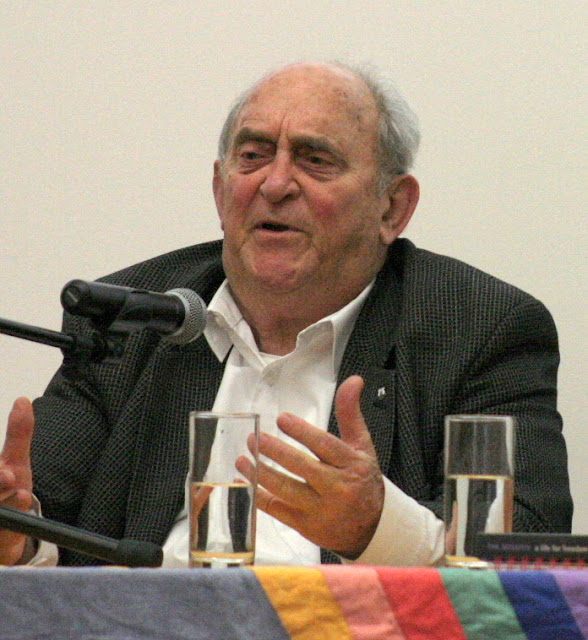
A Tribute to a South African Jewish Hero and Freedom Fighter
Gideon Levy
May 03, 2020 4:25 AM
A Jewish hero died on Independence Day, with his death unmarked here. Denis Goldberg died in Cape Town, the city he was born in, at the age of 87. He was the epitome of struggle, sacrifice, courage and solidarity, all the qualities so lacking in Israel’s left. If he’d immigrated to Israel, he’d be considered a traitor and terrorist here. But Israel never had Jews such as him, willing to sacrifice everything in the struggle for the freedom of the Palestinians.
In South Africa he wasn’t the only Jew who sacrificed all for the struggle for freedom of blacks. Ruth First was killed by a parcel bomb addressed to her, Albie Sachs lost an arm and an eye, later becoming a judge on the Constitutional Court of South Africa. There aren’t many Jewish communities that gave rise to such heroes. In Israel, obviously, no one tells their stories.
Goldberg wasn’t an esteemed Jew like Sheldon Adelson or an influential one like Israeli media personality Sivan Rahav Meir, but he and his friends were the heroes history will remember. They didn’t fight for their nation, they fought for others. It’s hard to think of loftier or more courageous conduct. If there is a reason for Jewish pride, it is these Jews who crossed the lines in South Africa, not falling in line with position taken by Jewish leaders in their country and the Jewish Board of Deputies, the biggest collaborator with the apartheid regime and its inveterate ally, the state of Israel.
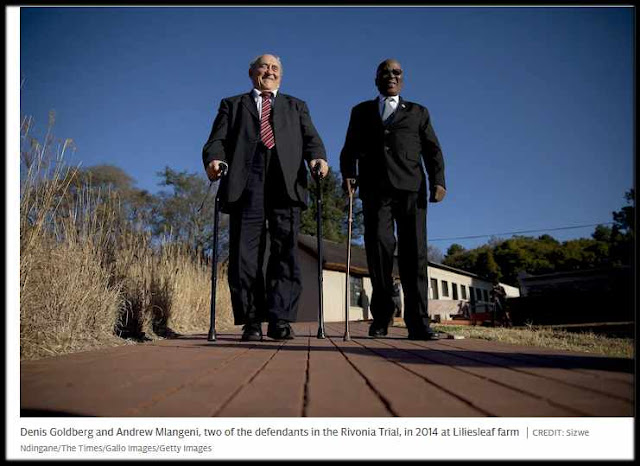
Goldberg was arrested along with Nelson Mandela on July 11, 1963, at the farm of Arthur Goldreich, another Jewish hero. Of the 17 members of the African National Congress who were arrested that day at Liliesleaf Farm, five were Jewish. At the Rivonia Trial, Goldberg was sentenced, along with Mandela, to four life sentences, for 200 acts of terror. These arch-terrorists are now considered national and international heroes, more food for thought in Israel.
In a heated debate in the literature section of Haaretz over the weekend, Professors Hannan Hever and Dan Miron discussed the courage of author S. Yizhar [one of the first writers to write about and issue a moral outcry related to the events of 1948]. Goldberg could have served as an example bolstering Hever’s position, since he believed in an armed struggle. He spent 22 years in prison until his release, owed in part to Herut Lapid, an Israeli activist who brought about the release of many prisoners.
Goldberg was flown to Israel, where he spent a brief time in his daughter’s kibbutz before hurrying to depart. Like his partners to the struggle, he detested what was happening here. He told historian Tom Segev that Israel was the Middle East’s South Africa and that the solution in both places should be identical: one state with equal rights for all. His vision was realized in his own country and Goldberg returned there, crowned in glory.
Over the weekend, Mandela’s grandson, Chief Zwelivelile Mandela, wrote on WhatsApp: “we salute a great man and a leader of our struggle…he belonged to a special generation of people who chose a life of struggle over one of convenience, unafraid of the brutality of the apartheid state.” Mandela ended his words with the Hebrew words commemorating a person’s memory. Shivers and Jewish pride. He added a photo of himself with Goldberg, when the latter was already in a wheelchair.
I didn’t know him, but I did meet two of his partners to the struggle, Ronnie Kasrils, who was the Minister for Intelligence Services under Mandela, and Ben Turok, a member of parliament on behalf of the African National Congress, both of them Jewish. There aren’t many Jews as sharply critical of Israel as these two were. One can’t be a freedom fighter like they were and think otherwise. In the eyes of people like them, who know a thing or two about human rights, equality and struggle, Israel is an apartheid state just like their country was.
But no one here wants to know about Goldberg and his associates. The residence of South Africa’s ambassador in Ramat Gan has been vacant for months, a protest against the occupation and apartheid. In an ironic coincidence, Goldberg died on Israel’s Independence Day. Let us light a symbolic memorial candle in his honor.